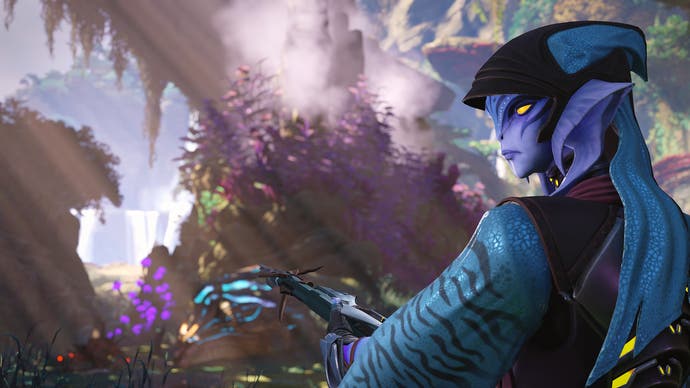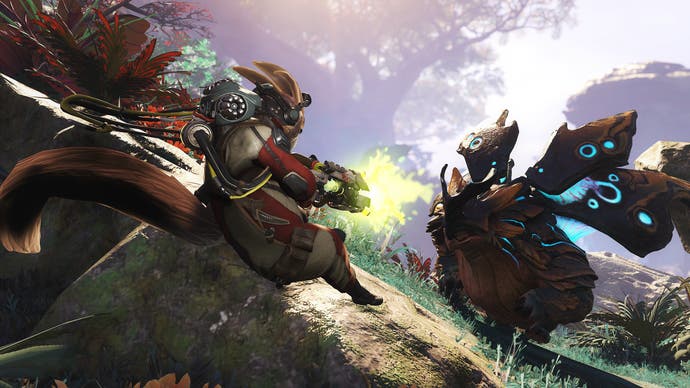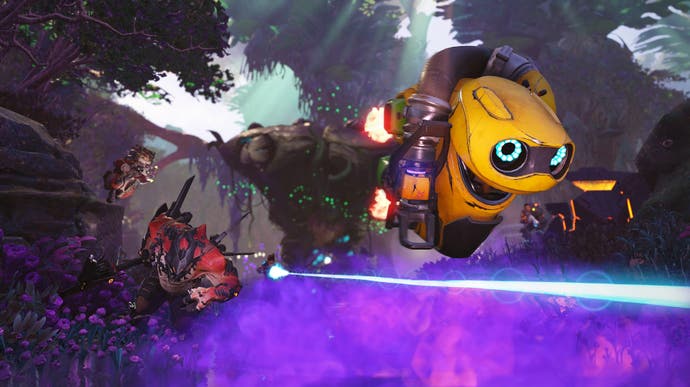How Amazon's Crucible went from being a battle royale to a team-based shooter
"We had to recalibrate."
When Crucible was announced in September 2016, it was billed as a "last one standing third-person shooter" in which 12 hunters enter an alien hostile world, but only one emerges victorious.
Not only that, it was said that because the world is dangerous, players would have to work together, and make or break alliances on the fly.
Crucible was also supposed to have a 13th player - "a new type of player" - who can broadcast and directly impact the game by creating events. And, it was said, viewers on Twitch would be able to interact with the "gamemaster" as well.
Three-and-a-half years later, as Crucible nears its launch as Amazon's first ever internally-developed PC game, it's clear things have changed - dramatically.
Now, Crucible is a free-to-download, team-based third-person shooter. I got the chance to play it for a few hours, and it's more MOBA than battle royale. There is a 4v4 mode, an eight teams of two mode, and an 8v8 mode. There's an emphasis on gathering resources, levelling up your character and working closely as a team to defeat AI-controlled aliens as well as enemy players.
It feels like the battle royale focus Crucible had back in 2016 has been relegated to one of the three modes: Alpha Hunters. Here, once you die, that's it. The eight teams of two fight to be the last team - or solo player - standing. If your teammate dies, you can temporarily fight with another player, but you'll be forced to fight against each other if you both make it to the final three.
The features that were meant to lean on Amazon's ownership of the streaming platform Twitch are also no more. That 13th player - the "gamemaster" who would broadcast Crucible and impact it, alongside their viewers, is nowhere to be found.
Clearly, Crucible, one of three games that were announced back at TwitchCon 2016 as part of Amazon's big push into video games, has changed significantly during its development. So what happened?
"There have been a lot of interesting things that have happened in ways that the game has evolved over time," Eric Flannum, creative director on Crucible, told Eurogamer as part of a roundtable interview held earlier in May.
"You know, if you go back to the announcement we made in 2016 or so, the way the game was described, there were a lot more Twitch features in it, and it was much more designed to be a battle royale. At the time, it was what we were shooting for.
"And then as we talked to streamers, as we played with our alphas, as we got feedback from all kinds of players, the game started to evolve. And we started making decisions based on all of that. So things like some of the Twitch features became less important. There's still things that we plan to do, but we had to recalibrate where we were at."

Specifically on those interesting-sounding and now-dropped Twitch features, Crucible franchise chief Colin Johanson told us the developers received feedback from streamers that suggested they let the game speak for itself first. The developers took this feedback to heart - and streamers have been such an important part of the development process that they're in the Crucible credits.
"Crucible has been designed and built from the ground up with Twitch streamers as a part of the entire process," Johanson said.
"And that really defines the integration above all else, for us. We've had a core community of Twitch streamers and competitive gamers who for years have been working with our development team, sitting alongside us even, and giving feedback and helping us adjust and play the game with us to build a game that was both a game we were proud of, but a game they would be really excited about streaming and playing as well.
"And I think that integration is maybe the most innovative thing we've done above all else with this game with Twitch, is to really let them be a part of the design and the development process from the very beginning.
"And the game has changed dramatically as a result of that relationship. And that core group has been with us all the way through. We're even including them in the game credits, because we want to give them a shoutout for everything they've done to help us get to this point.
"That's the most important thing we've done across the board with Twitch with this game."

According to Johanson, feature-specific Twitch integration "will come later". "We felt like the focus for day one should be on making a great game," he said. "And if we showed up with a whole bunch of cool Twitch integrations, and we didn't have a great game, no-one would care. If we show up with a great game people were excited about, and then we add more integrations and technology with the Twitch platform in the future, that made more sense.
"That's really the same feedback our entire Twitch streamer program was giving us: hey, don't go build all these custom, one-off Twitch features. Build a great game, and then we can add that stuff later once people really like it, but don't distract from the game experience. And so that's what we're doing. If the game is successful and people like it, and boy, we sure hope they do - that'd be awesome! - then that would be stuff that we would do in the future."
Coupled with the shift away from specific Twitch features came an effort from the developers to make Crucible unique. After PlayerUnknown's Battlegrounds exploded in popularity as a Steam early access title in March 2017, the battle royale genre became all-encompassing and overcrowded. All of a sudden Crucible's pitch as a 12-player last character standing shooter didn't seem all that unique.
"If you look at things that have happened in the shooter space," Flannum continued, "2016, PUBG wasn't even out yet. So it was a very, very different looking kind of space. So one of the things we had to do was constantly look at how we could evolve the game so it felt fresh."
As the developers did this, they changed the core of the Crucible experience. It became a "hunt, level, adapt" game. Modes such as Heart of the Hives, where players have to kill huge alien boss creatures and capture their hearts while also fighting the enemy team, emerged.
"I always think of games as organic, and you have to listen to what they want to be," Flannum said. "We've done that. Hopefully it will resonate with people. And we feel like we're versatile enough that we can take a lot of feedback from the people who do love the game and make some really, really cool things with it in the future."
Now, Crucible is more akin to a couple of games that have fallen by the wayside: Epic's Paragon and Motiga's Gigantic. Amazon, which has invested heavily in video games and is set to release a video game streaming platform of its own, will be hoping Crucible avoids a similar fate.




